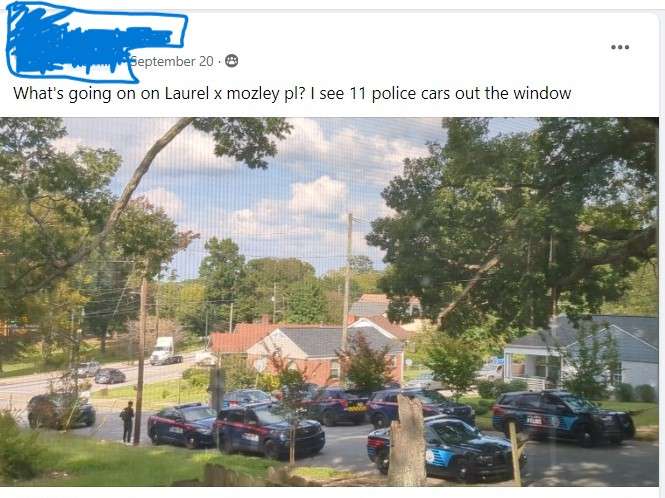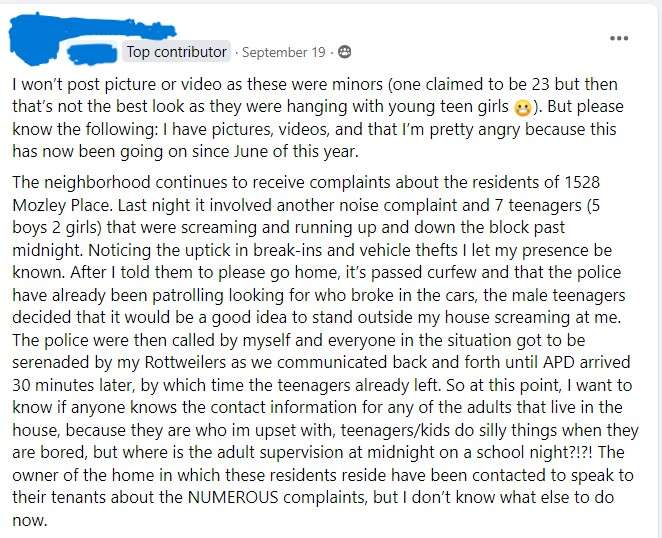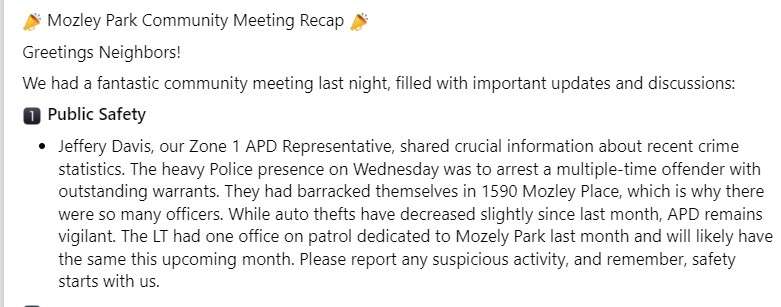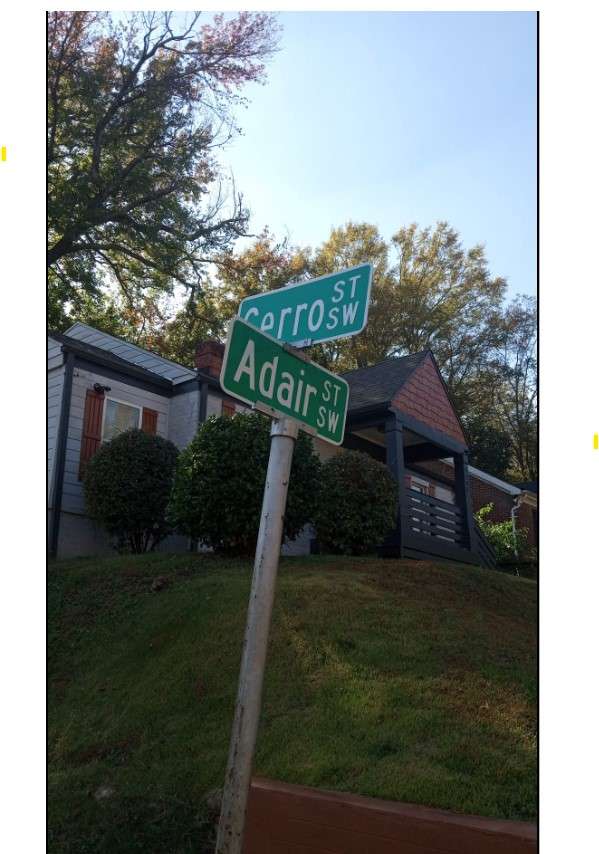
Trust but Verify
Open Records complaints can be an excellent means of transparency. Unfortunately in Atlanta, we seem to interpret the law differently here. I referenced them previously as a means of accountability. But what happens when they don’t work? Unfortunately, this piece will give you an example of just that. This involves a records request I made to the Atlanta Police Department that involved a multi-unit police raid on a house in my neighborhood, the theft of our family’s car, and children I know. Leading up to that raid, my family’s vehicle was stolen, and because of my interaction with the police, I knew that pictures of minors were shared with APD officers in text messages that were taken from a FB post in my neighborhood Facebook group (they were shown to my husband and me by Officer Mira of the APD, a responding officer) after the recovery of our car. A few days after our car was stolen and preceding the raid, someone shared in our Neighborhood Facebook group that a call was made to the police regarding a noise violation. I requested information about all of this, including shot spotter data from June through the date of the request. To date, I have very little documented information to share with you about these things. So I’ll leave you all with the question it leaves me:
What do we do in a system that doesn’t have equitable accountability measures in place for the people to hold their government accountable?
Let me take a step back.
Our family car was stolen sometime while I was sleeping, the night of Sept. 15th and reported stolen to the APD on Sept. 16th. I didn’t want to call the APD, but until we update our system like what I understand Columbus has, residents here still have to call into 911 to report theft. My husband called it in for insurance reasons. The care was recovered, after some neighbors posted pictures of it, along with minors that were walking in the vicinity of it, post-Mad Max joyride. That post was removed from the Facebook group and my husband and I specifically told the APD we would not press charges.
Here’s the screenshot of the subsequent noise violation call.

While I have the recording of the phone calls that were placed to 911, I am choosing not to share those because they use personal names and addresses that identify the caller, neither of which are essential to my point here. Anyone could have made the calls. I will share a transcription here that begins with the caller specifically identifying a need for patrols “again, per usual” and the juveniles as “a group of teenagers breaking into people’s cars…they’re out past curfew now, doing it again. They just ran up and down the street, going west on (street name) toward (street name).”
Responding 911 caller asks, “You’ve seen them breaking into cars?”
“Ya- the same pictures, the same teenagers…they’ve been doing this in the neighborhood. Major Moorman has the pictures. Nothing’s been done. So they said ‘call anytime we see them’, so I’m doing as instructed.
“How many kids is there?”
“It had to be at least 7 kids out just now. Middle School to teenage”.
A question & answer about male/ female components of the group.
“And you said they are known to break into vehicles?”
“Yes, and we have pictures if you need to come to the house and see them.”
“OK, and do you want to speak to police?”
“Yes, please.”
Confirmation of the caller’s address, name, and phone number.
The caller then confirms that the police will speak with the caller afterward.
Here’s a screenshot of the picture in my neighborhood on the day of the raid.

Here is my original request. I realize my language isn’t as precise as would be preferred, but I did request “all communication” and often find that these open records requests have a follow-up call or email to ensure everything is fully understood on both sides and best efforts are made to get the requested records. My request was submitted via APD’s online open records request system. Ironically, the speedy provision of records was touted by staff in the first session of the Atlanta Citizen’s Police Academy. That hasn’t been my personal experience. I made the initial request on Sept. 24, 2023 and received the last communication regarding this on November 15, 2023.
Here’s the information shared in our Neighborhood Meeting Recap.

Additionally.

I waited a month before filing an open records complaint with the Attorney General’s office. I recognize the APD has many more important things than providing me with records. I didn’t assume they were just blowing me off. It took a series of calls and emails exchanged, which ended on November 15, 2023.
The request for shot spotter data is information unrelated to the calls or raids. It’s just a REALLY expensive and often not super reliable reporting tool that has been used by the U.S. military in war zones. Some U.S. cities now use the tool to locate gun-related crimes. My husband hates it and thinks it’s a waste of money. I think of it as yet another way for a private entity to make money off of the government or (like FUSCUS) the Atlanta Police Foundation, instead of hiring police officers.
When I went through the Citizen’s Police Academy, an outline of my neighborhood was hanging up in the Zone 1 Precinct labeled as “Shot Spotter”, so I know my neighborhood was a part of the use of this tool. When I asked if I could take a picture, the very nice, accommodating officer who was working me into my ride-along (it was clear no one had given him any heads up) said “no”, so I respected his response and can share no picture of the outline here. My ride-along concurred with the pilot program for the APD’s second trial of Shot Spotter as a tool. I am interpreting the fact that my request produced no shot spotter data is because of the dates I chose to request, not an obstruction of data.
After I filed the Open Records Complaint, (as expected) the civilian in charge of providing the records called me and we discussed search terms and what I was ultimately trying to receive records around. As a victim in presumably one of the cases against this individual involved in the raid, I have a right to knowledge of the proceedings around the case. I know the constitutional basis of victims’ rights in Georgia, not because the APD provided me with this information nor because the Open Records Custodian provided it. I know this because my husband was a part of the team that changed the constitution to provide these rights to the state of Georgia. It was a constitutional change that ran on the ballot a few years ago called Marsy’s Law. Peach Pundit readers would probably recognize the names of Julianne Thompson, Brian Robinson, and Anne Casas, who were a part of the team that made that constitutional change possible. There are more, but it reads more like a subscriber list of Peach Pundit.
Aside from information not being shared with my husband and me, a contributing part of the challenge was that the particular street I referenced in my request is broken- as in the street continues in name, but breaks at an intersection so that it isn’t a straight line across the neighborhood. It doesn’t change names, it just doesn’t follow a straight line. I’m not sure why this would present a challenge in a search, but the civilian I spoke to doing the records search indicated he was unaware that the street was broken, and that seemed to impact the search.
This isn’t unique to my neighborhood either.
I ran the Peachtree Road Race annually for a decade with my mother. She drove in from Walton County, and I would meet her either at the Midtown or Lenox MARTA station, leaving her car parked close to Piedmont Park. At some point, she parked off of 5th Street in Midtown/ Poncey Highlands. While one might think that like Savannah’s squares, numbers might present a grid-like layout, in Atlanta they would be wrong. I don’t remember how long we walked looking for her car, but I do remember when I figured out our mistake of thinking the street continued in a straight line. Roads also change names at certain points here (thank you, RACISM) and (strangely recently) have been mislabeled in my neighborhood.
Here’s a picture of a road sign in my neighborhood that mislabeled a road. The road should be Gideons- it’s two roads back from my home. You can look it up on Google Maps.

I believe this mistake can be attributed to ADOT, not APD, but I wonder how this affects the reporting and recording of records. Is this road correct on city maps used by APD and ADOT? I wonder how this affects the Dept. of Planning’s provision of building permits and code violations. I know the 911 system uses latitude and longitude instead of numeric addresses, but it isn’t clear to me that the APD uses a system with that exact location. And in case I’m not making it clear enough- I know roads aren’t intentionally labeled in ways to make Open Records Requests difficult- they’re just a quirky feature of an older city, not an issue of obstruction of information.
All of these challenges together make it difficult to have any reliable retrieval of records. None of this is the APD’s fault, nor did I feel the need for an individual to be investigated for this. The Open Records Custodian was simply providing (to the best of his ability) what his system allows him to provide. Mind you, I never received those text messages Officer Mira shared or images shared with Major Moorman, but I assume this is because neither were placed into a searchable database. That is a personal error, not systematic unless you want to conclude that Officer Mira and Major Moorman both intentionally didn’t place those photos in any searchable database. I assume they didn’t bother- again- not assuming obstruction of information.
And this is the second time I can demonstrate that City of Atlanta employee’s cell phones are not part of what the City of Atlanta considers open records, even though I’ve seen the messages, and in one case, have provided copies of the images. Fascinating, isn’t it?
Oh, and after this search was completed, I found it terribly interesting that I got a call from the Police Foundation, asking me for a donation- even though I didn’t get half of the information I requested. When I asked the caller where he got my number, he hung up. I guess the Atlanta Police Foundation assumes that if you interact with the police, you should get a call and request a donation, even when the result isn’t optimal and there’s little likelihood you’ll donate.
It left me with even less of a feeling of public trust and more of a feeling of a shakedown.
The question I often ask myself when dealing with the City of Atlanta:
Is this incompetence or malfeasance?
I usually assume the former rather than the latter. That seems to be the story of Atlanta (maybe Georgia as a whole) right now- our systems are no longer competent for the services they are to render. It seems like we took a scenic detour for about fifty years here and we’re just now beginning to look at a map and (metaphorically) scratch our heads.
This matters in that Atlanta has a rather robust history of corruption along the lines of kickbacks and embezzlement by Mayors, insider contracts with our Airport, and the sorrowful death of an elder at the hands of that infamously over-zealous Red Dogs band of police. (Addresses mattered a WHOLE lot in that SWAT raid, killing an innocent, elderly woman.)
If our citizens cannot ask reasonable questions and find documented reasons for police action, how do we ‘trust, but verify’?
Interestingly enough, I find talking to neighbors- adults and kids to be far more reliable for information. Watchful neighbors stood with children and filmed while the APD questioned kids around the raid. Another neighbor had an APD vehicle back into their parked car. One child told me about how he mistakenly got too close to the action (he was walking home) and an officer turned to face him with a long gun. I’ve met kids in the five years I’ve lived in my neighborhood who have experienced no-knocks or short-knocks. They didn’t use those exact terms, but their description of the events matched police procedures for these things.
Learning what I have about trauma, I often wonder what’s worse- the crime or the solution.
I think most people think of calling the cops as a solution. That is their freedom of choice. I just wonder what seeds we’re sowing when that’s the default. In another Westside Atlanta neighborhood’s Facebook group, I saw a gentle reminder to talk to your neighbors BEFORE calling the cops. The insidious truth of this is that people are afraid of one another for myriad reasons- not race, gender, or ethnicity alone. And this fear of the proverbial ‘other’ invites us to phone a cop, which often escalates, rather than de-escalates the situation. In my neighborhood’s case- it led to a SWAT raid that I cannot believe anyone wanted. This isn’t to say LEOs seek to escalate situations, I mean more to say that seeing anyone with a gun and a badge makes many people’s pulse quicken, even when they’ve done nothing wrong. I’ve shared openly it does me.
Conservatives may find my questioning of police as unrelatable. Yet, I find few who cannot understand that our systems should involve a means of verifying the actions taken by the state against its own people. Progressives seem to just wish I would stop giving our Mayor and City a hard time.
I rest in the belief that Georgians can walk and chew gum at the same time. We recognize nuance and can do hard things. If we want better, we’ve got to also do better.
I would posit that if the Mayor (and Governor?) want to reduce crimes if they want to reduce gangs, if they want to make our neighborhoods safer, I don’t think it’s going to be based on trusting a system that can’t easily and reliably provide verifiable records. The basis of the judicial system is a belief in innocent until proven guilty and (in criminal cases) to be convicted upon (usually) verifiable evidence. I’m struggling to see how I, as a citizen of Atlanta, have equal and equitable access to the same data that the police used to justify a raid. I’m not saying it doesn’t exist. I’m not even saying that I have a right to all that information.
All I’m saying is that our system isn’t currently even set up to provide that to the general public, in a time when we’re trying DESPERATELY to rebuild public trust.
If we want to have sustainable safety, we have to know and be connected to our neighbors-even if they irritate us and keep us up. It’s really hard to walk back calling the law on someone. If we want to have a trusted system, we have to share and be able to demonstrate how our systems work equally and equitably for all. To prove that without a shadow of a doubt, we have to have systems that can also be verified by any random Dick or Jane. If our systems cannot do that, then updating them would probably instill far better trust in the APD than any new $67M training center ever shall.
My bet is, it’d be cheaper too.
Edited to add: After hitting publish on this a neighbor posted on Facebook that their car was broken into overnight. It seems that the raid didn’t resolve the car break-ins, either, sadly.
